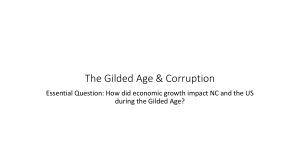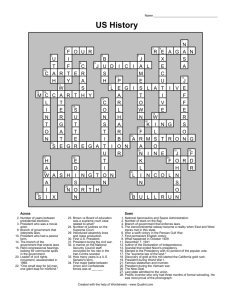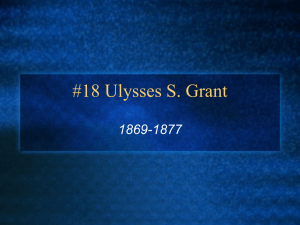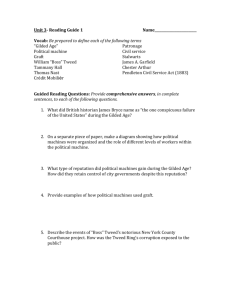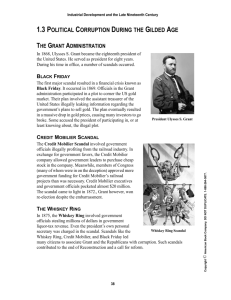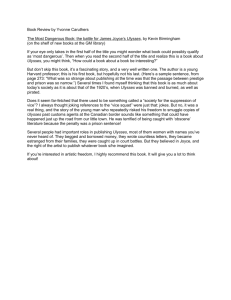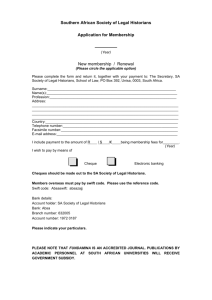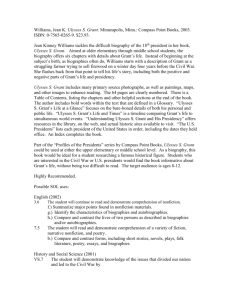Grant Reassessed
advertisement
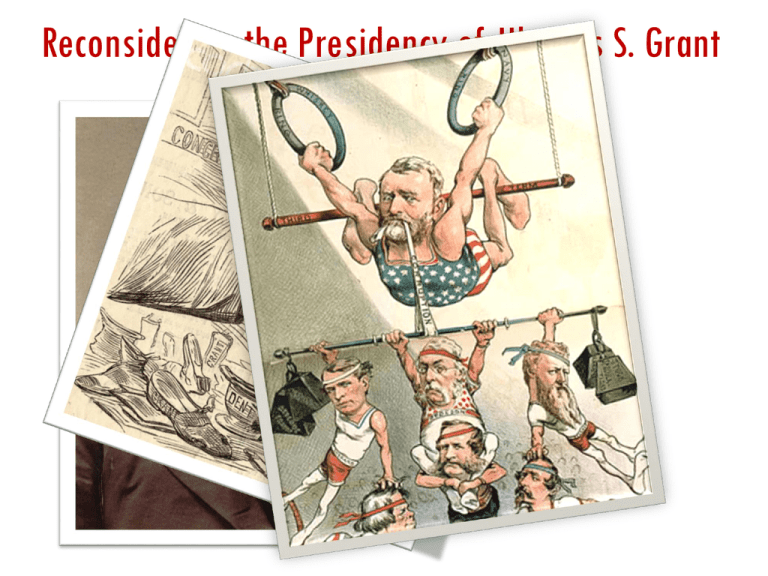
Reconsidering the Presidency of Ulysses S. Grant Historians Comment on Grant “Grant was an ignorant and confused President, and his eight long years of blunderland are generally regarded as a national disgrace.” Thomas A. Bailey Arthur Schlesinger places him among the failures in his 1948 & 1962 presidential ratings. C. Vann Woodward contends that we can attribute to Grant “the all time low point in statesmanship and political morality in our history.” Corruption Much of the evidence for these charges comes from Liberal Republican “spoilsmen” Corruption list the corruption and graft that occurred during Grant’s presidency. Should politicians or any person in power practice patronage? Do “patronage” and “corruption” differ? Should historians judge the people in the context of their times? Corruption? Patronage seems to be the way things were done in this time, and it did not originate with Grant. Worst Presidents: Ulysses S. Grant (1869-1877) US News and World Report By Jay Tolson At No. 7, Ulysses S. Grant has risen from No. 2 on the 1948 Schlesinger list probably because of the same revisionist take on Reconstruction that lowered Johnson in the eyes of historians. Although there is no way to overlook the widespread graft and corruption that occurred on his presidential watch - it was at the time unprecedented in scope - he was in no way a beneficiary of it. "My failures have been errors of judgment," the popular former Civil War general admitted, "not of intent.“ More important, the 18th president now receives plaudits for his aggressive prosecution of the radical reform agenda in the South. His attempts to quash the Ku Klux Klan (suspending habeas corpus in South Carolina and ordering mass arrests) and his support for the Civil Rights Act of 1875 were controversial and may have produced only short-lived gains for African-Americans, but Grant's intentions were laudable and brave. He also worked for the good of American Indians, instituting the reservation system as an imperfect, last-ditch effort to protect them from extinction. Grant's reputation may continue to rise as a result of sympathetic biographies and studies - and because of a renewed appreciation of his own excellent memoir, considered to be the best ever produced by a former president. Grant’s Civil Service Commission anticipated the Pendleton Act of 1881. Grant issued an earnest call for civil service reform in his Second Annual Message in 1870, and ousted almost 200 officials. Crédit Mobilier scandal took place in the Johnson administration before Grant was president. The Defense Grant’s Civil Service Commission anticipated the Pendleton Act of 1881. Grant issued an earnest call for civil service reform in his Second Annual Message in 1870, and ousted almost 200 officials. Credit Mobilier scandal took place in the Johnson administration before Grant was president. Editorial cartoon: Uncle Sam directs U.S. Senators (and Representatives?) implicated in the Crédit Mobilier scheme to commit Hari-Kari. Carl Schurz and Charles Sumner peer out from behind a screen. Jay Gould and Jim Fisk attempted to corner the gold market, but were thwarted when Grant ordered the federal government to sell gold. [Gold Scandal] There was also the Salary Grab, which was by Congress, not the executive. The Tweed Ring was a New York City scandal that had nothing to do with the federal government. The Whiskey Ring began during the Johnson administration and was uncovered [and punished] during the Grant Administration. Grant’s Ineffective Presidency? Grant brought the country through eight years of difficult times after a destructive Civil War had almost torn the country apart. Grant pursued an economic policy that restored prosperity, reduced taxes, restored a favorable balance of trade and reduced the national debt. He vetoed the Inflation Bill of 1874, and passed the Resumption Act of 1875, which dealt with the Panic of 1873. Grant settled the Alabama Claims [US had claims against the UK] with an arbitration treaty with Britain, a model for future peaceful settlements of disputes. He also squashed two other potential wars, the Cuban Rebellion [1870] and the Virginius Affair – potential war with Spain [1873]. He secured a commercial treaty with Hawaii, which pointed toward eventual annexation. Grant had a major role in the Hayes-Tilden election, which threatened to tear the country apart again, and he helped with the smooth transition called The Compromise of 1876. Grant appointed the first Civil Service Commission. Grant began the process which led to the building of the Panama Canal. While Johnson’s failure to deal well with Congress led to his near impeachment… Grant employed the veto a record 93 times He also sent troops to enforce reconstruction and protect the hardly an example of a weak executive. newly freed slaves – It is interesting that revisionist historians criticize Grant for his too vigorous attempts to protect the freedmen, thus bringing about the “Solid South” – Southern support for the Democratic Party beginning in 1877. Grant and the South Grant and the South Grant insisted that reconstructed states ratify the 15th Amendment before reentering the Union. His annexation treaty for Santo Domingo, rejected by the Senate, would have provided a possible refuge and political voice for blacks. Frederick Douglass said of him, “Our shelter in the storms of the past has been Ulysses S. Grant. The question is, who will shield us in the future.” Protections for blacks also included the Enforcement Acts [1870] and the Civil Rights Act [1875] - both of which are credited with the demise of the Ku Klux Klan. Grant was elected twice to the Presidency, and was the most popular and admired figure of his time. He is the only President to be elected to two consecutive terms between Lincoln and McKinley. Your thoughts… What grade would you give Grant’s presidency? Should historians judge the people in the context of their times? Why do you believe an industrialist might view Congressmen as hypocrites? Please copy down and respond to the following. Why is Ulysses S. Grant generally considered to be an unsuccessful president?
